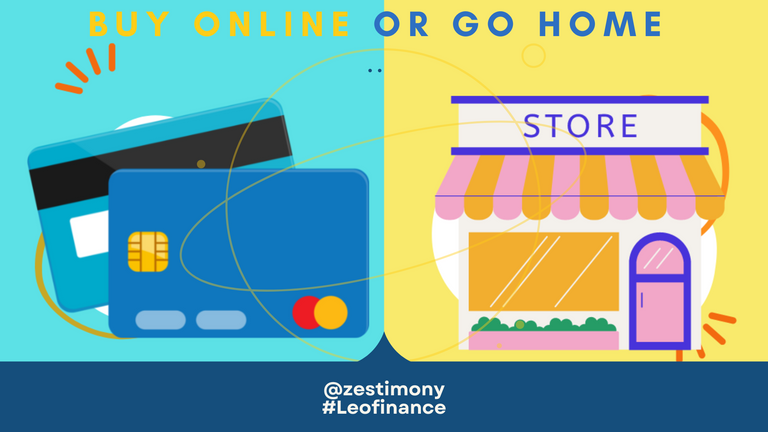What you See Vs What you Get: Online Shopping Vs Physical Shopping

As someone who has experienced both online shopping and physical shopping, I have to say that it really depends on the situation. Both have their pros and cons, and it's up to the individual to decide which one is the better choice.
Online Shopping
One of the main benefits of online shopping is convenience. It's so much easier to shop from the comfort of your own home, and you don't have to worry about fighting crowds or finding a parking spot. You also have a much wider selection of products to choose from, since you're not limited to the inventory of a single store. Plus, with the ability to easily compare prices from different retailers, you're more likely to find a good deal.
Physical Shopping
On the other hand, physical shopping has its own set of benefits. For one thing, you get to see and touch the products in person, which can be helpful when you're trying to make a decision. You can also get immediate gratification by leaving the store with your purchases. Additionally, shopping in person can be a social activity, whether you're with friends or just enjoying the atmosphere of a busy store.
Which Shopping?
In terms of which one is the preferred choice, it really comes down to personal preference. Some people might prefer the convenience and wide selection of online shopping, while others might enjoy the tactile and social aspects of physical shopping. Ultimately, it's up to the individual to decide which one works best for them.
Briefly touching on "What you see Vs What you get: The "what you see vs what you get" phenomenon refers to the discrepancy between the appearance of a product as it is presented online or in advertisements, and the actual product that is received. This can occur in both online and physical shopping, but is more common in online shopping due to the lack of physical interaction with the product.
One example of the "what you see vs what you get" phenomenon is when a product is advertised with certain features or qualities, but upon receiving it, the product does not live up to those claims. This can be disappointing for the consumer, who may feel like they were misled or that they did not get their money's worth.
Another example is when a product appears differently in pictures or advertisements than it does in person. This can be due to factors such as lighting, angles, or touch-ups in the images, which can give a distorted view of the product.
Overall, the "what you see vs what you get" phenomenon highlights the importance of carefully researching and evaluating products before making a purchase, whether online or in person. It is important for consumers to be aware of this phenomenon and to not rely solely on the appearance of a product as presented in advertisements or online.
My Shopping

Image by Pete Linforth from Pixabay
As someone who has experience with both online shopping and physical shopping, I have come to the conclusion that my preferred choice is online shopping. This is mainly due to the convenience and wider selection of products that are available online. With online shopping, I can shop from the comfort of my own home and don't have to worry about crowds or finding a parking spot.
I am also a frequent user of AliExpress, which allows me to easily obtain products that are not available locally in Nigeria at very affordable prices (or available but pricey). The ability to compare prices from different retailers online also makes it easier for me to find good deals.
While physical shopping does have its own set of benefits, such as being able to see and touch products in person and the social aspect of shopping with friends, the convenience and cost-effectiveness of online shopping make it my preferred choice.
Additionally, online marketplaces like AliExpress have implemented advanced dispute resolution processes to help counter the "what you see vs what you get" issue. These processes are designed to protect the interests of both buyers and sellers and to ensure that any disputes that arise are resolved fairly and efficiently.
One way that AliExpress addresses this issue is by offering a buyer protection program. This program covers eligible purchases and provides a range of benefits, including protection against fraud, receiving a defective or incorrect item, or not receiving an item at all. If a dispute arises, the buyer can submit a claim through the AliExpress platform and the company will work to resolve the issue.
Another way that AliExpress helps to address the "what you see vs what you get" issue is by providing detailed product descriptions and high-quality images, as well as allowing buyers to leave reviews and ratings for products. This helps to give buyers a more accurate representation of the products they are considering purchasing, and can also help to identify any potential issues or concerns.
Overall, the dispute resolution processes implemented by online marketplaces like AliExpress are effective in helping to counter the "what you see vs what you get" issue, and provide a level of protection and security for both buyers and sellers.
Both kind of shopping has their own pros and cons. Online is convenience, physical is lively. You are right in stating that it is a personal choice which one is preferred. It also depends o prior experiences that help us decide our preferred choice
Rightly said! Some persons that's have very ugly "what you saw vs what you got" experience sworn never to buy anything online again. Personal experience plays significant role
😊
I lean more towards physical shopping but I know that both just have their pros. You gave a good run down of both options.
Well-done!
Thanks cheeamaka. I understand as a girl you are, physical shopping sometimes it's more than shopping, it could be more like outing 😉
Outing😂😂
I just like it. Whichever is convenient at that time, I shoot.
Hmmmm I think you know the risks attached to buying online bro, you even stated it up above, the probability of getting what you ordered is 70/30 which is okay and I agree on stress free, convenience and others but seeing and feeling what you want to buy is best and then what if your order goes bad???
You have to fill refund form and submit and after days you get refund and by then the urgency for which u bought the goods for is gone and whereas it can be prevented by shopping physically...
It was a nice post welldone bro...
Thanks Quduus1! You know here in Nigeria where I live, the best customer support for any form of purchase are the ones online. For physical purchases, customer support is almost zero. Urgency of purchase is a valid point though, but I just like the comfort online stores provide. For example, Jumia gives you 7 days to test your product and within which u can request a return, AliExpress is the most generous providing up to 15 days. No physical store will ever try that
Normal normal brother, we all av choices and they both have ad and disadvantages and that is why we need to be careful at all times ...
Thank you bro
I use both depending on what i wish to buy. For example like you, I buy from Aliexpress too. Compared to some local products and prices, they have more and usually at a lesser price. And like you said, there are things you wont even see in the local market here.
But then, I also use physical shopping because somethings are best bought in person. And the risk is what you see is not usually what you get is not in physical shopping. And when you want to buy goods that are best consumed fresh like fruits, you buy in person.
Well spoken my Oga fokusnow. Things like food are best obtained in person. Though, physical shops are now devicing means to trick buyers oh! They are doing a lot of things these days. Whether online or in person, person just need to dey careful.
Of course, these two shopping models have their own advantages and disadvantages. It all depends on how we view the shopping model we want, and also depends on the habits we choose.
Well spoken bro.